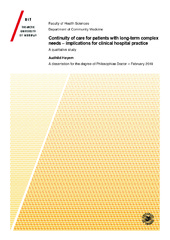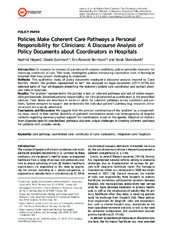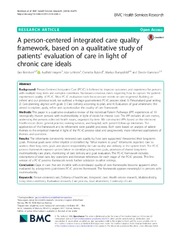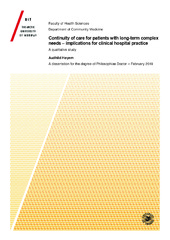| dc.contributor.advisor | Gammon, Deede | |
| dc.contributor.author | Høyem, Audhild | |
| dc.date.accessioned | 2019-05-29T12:34:08Z | |
| dc.date.available | 2019-05-29T12:34:08Z | |
| dc.date.issued | 2019-05-20 | |
| dc.description.abstract | The background for this thesis is lack of knowledge that covers the broader perspective of development, implementation, and evaluation of continuity of care-solutions for persons with diverse and complex needs in hospitals and across health services.
The aim was therefore to investigate implications for hospital practices related to realizing continuity of care for patients with long-term complex needs, at the intersection between policy, practice, and patient experiences.
Three different qualitative studies were conducted: A discourse analysis of policy documents (Study I), an interview study with healthcare professionals (Study II), and an evaluative analysis of individual patient pathways using individual interviews (Study III).
It was found that Norwegian policy documents define the lack of coherent care pathways for patients with complex needs as a responsibility issue, which constitutes an argument for extended personal responsibility for clinicians (Study I). Clinicians in hospitals developed personal and context-sensitive coordinator roles and adjusted their ambitions to what they considered doable within their authority and accessible resources (Study II). Patients with diverse and complex needs did not experience a pathway perspective, long-term goals or evaluation in their trajectories (Study III).
In summary, it was found that the Norwegian policies on coordinator roles in hospitals highlight ideals that resonate well with what patients want in terms of continuity of care. However, both patients and health-care providers experienced substantial challenges related to the realization of these ideals. To improve this situation, it is suggested that a pathway infrastructure is implemented for these patients, with structural requirements that still allow for variation. Recommended elements are a flow chart showing ideal pathway phases, mandatory documenting and reporting on designated points, systems for patient feedback during the process, and dedicated pathway coordinators. | en_US |
| dc.description.doctoraltype | ph.d. | en_US |
| dc.description.popularabstract | This thesis investigates implications for hospitals practices in realizing continuity of care for patients with complex or long-term needs, at the intersection between policy, practice, and patient experiences. This investigation was done in three qualitative studies: A discourse analysis of policy documents, an interview study with healthcare professionals, and an evaluative analysis of individual patient pathways using individual interviews.
It was found that the Norwegian policies on coordinator roles in hospitals highlight ideals that resonate well with what patients want in terms of continuity of care. However, both patients and health-care providers experienced substantial challenges related to the realization of these ideals. To improve this situation, it is suggested that a pathway infrastructure is implemented for these patients, with structural requirements that still allow for variation. | en_US |
| dc.description.sponsorship | Helse Nord RHF, the Regional Health Authority of Northern Norway | en_US |
| dc.identifier.uri | https://hdl.handle.net/10037/15401 | |
| dc.language.iso | eng | en_US |
| dc.publisher | UiT The Arctic University of Norway | en_US |
| dc.publisher | UiT Norges arktiske universitet | en_US |
| dc.relation.haspart | <p>Paper I: Høyem, A., Gammon, D., Berntsen, G.R. & Steinsbekk, A. (2018). Policies Make Coherent Care Pathways a Personal Responsibility for Clinicians: A Discourse Analysis of Policy Documents about Coordinators in Hospitals. <i>International Journal of Integrated Care, 18</i>(3), 5. Also available at <a href=https://hdl.handle.net/10037/13384>https://hdl.handle.net/10037/13384</a>.
<p>Paper II: Høyem, A., Gammon, D., Berntsen, G. & Steinsbekk, A. (2018). Keeping one step ahead: A qualitative study among Norwegian health-care providers in hospitals involved in care coordination for patients with complex needs. <i>International Journal of Care Coordination 21</i>(1-2), 15-25. Published version also available at <a href=https://doi.org/10.1177/2053434518764643>https://doi.org/10.1177/2053434518764643</a>. Accepted manuscript version available at <a href=https://hdl.handle.net/10037/13402>https://hdl.handle.net/10037/13402</a>.
<p>Paper III: Berntsen, G., Høyem, A., Lettrem, I., Ruland, C., Rumpsfeld, M. & Gammon, D. (2018). A person-centered integrated care quality framework, based on a qualitative study of patients’ evaluation of care in light of chronic care ideals. <i>BMC Health Services Research 18</i>(1), 479. Also available at <a href=https://hdl.handle.net/10037/14925>https://hdl.handle.net/10037/14925</a>. | en_US |
| dc.relation.ispartofseries | ISM skriftserie; 204 | |
| dc.rights.accessRights | openAccess | en_US |
| dc.rights.holder | Copyright 2019 The Author(s) | |
| dc.rights.uri | https://creativecommons.org/licenses/by-nc-sa/3.0 | en_US |
| dc.rights | Attribution-NonCommercial-ShareAlike 3.0 Unported (CC BY-NC-SA 3.0) | en_US |
| dc.subject | VDP::Medical disciplines: 700::Health sciences: 800::Health service and health administration research: 806 | en_US |
| dc.subject | VDP::Medisinske Fag: 700::Helsefag: 800::Helsetjeneste- og helseadministrasjonsforskning: 806 | en_US |
| dc.title | Continuity of care for patients with long-term complex needs - implications for clinical hospital practice. | en_US |
| dc.type | Doctoral thesis | en_US |
| dc.type | Doktorgradsavhandling | en_US |


 English
English norsk
norsk



